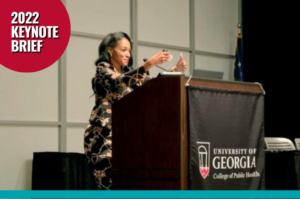By Zharia McKenzie
 Montrece McNeil Ransom remembers the morning her mother her down, her hands parting her hair, braiding it, as they sat in silence. She was asked to wear her Sunday best, even though it was a Friday, a school day.
Montrece McNeil Ransom remembers the morning her mother her down, her hands parting her hair, braiding it, as they sat in silence. She was asked to wear her Sunday best, even though it was a Friday, a school day.
She had been getting ready for her mother’s marriage, an event that marked her first days of belonging to the McNeil family of three. She felt happy. Safe.
To her, this was the first important lesson about how finding a sense of belonging can have a positive influence on health and well-being.
Ransom, now a leading expert on public health law and public health workforce development, shared this story to open her keynote address at the 2022 State of the Public’s Health Conference on October 27, in Athens, Georgia.
In her current role as the Director of the National Coordinating Center for Public Health Training at the National Network of Public Health Institutes, Ransom focuses on how a sense of belonging can lead to increased community engagement, social engagement and community and self-advocacy. She stressed the importance of self in this process, saying that it has to come from within.
“A sense of belonging is something you must create for yourself,” Ransom said. “Other folks are going to get it wrong.”
Ransom’s position in the public health workforce allows her to cultivate cultures of belonging, empowering others to apply their gifts and skill sets to enhance the field. One important aspect of this, Ransom said, is to be in the right and suitable place.
“Belonging is not about fitting,” Ransom said. “It’s been said that if I get to be me, I belong. If I have to be like you, I fit in.”
Some privileges come with belonging, but there are challenges too. According to data from the Census Bureau, within a week of Georgie Floyd’s murder, anxiety, and depression increased among black Americans.
The body keeps score, Ransom reminded the audience, and racism is one determinant of health. Following Floyd’s murder, racial health equity was a topic of open dialogue when discussing health disparities.
To curate change, Ransom said public health practitioners need to lead with belonging. She shared a model that sparks a culture about belonging and the workplace:
S – make pace for authenticity
P – be professionally competent and personally compassionate
A – develop an acceptance mindset
R – representation
K – know your biases
Ransom said she hopes that individuals will choose to be a creator of belonging for other people.
“It’s about human connection. When we feel like we belong, we feel called to come together just like me, my mom and my dad to build our version of a better future and bring it to life,” she said.
